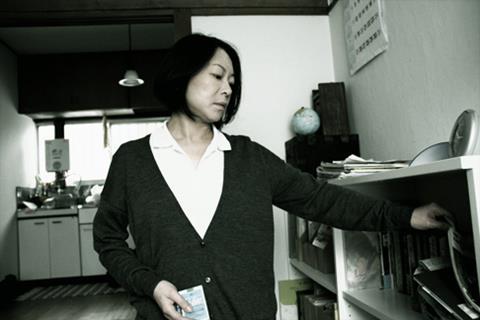Dir/scr: Bunyo Kimura. Japan. 2012. 86mins

This slow-burn black-and-white Japanese drama is an intense claustrophobic film that astutely and gently draws out its plot, opening as a gently paced story about a weary couple debating their relationship in their tiny apartment, but unravelling into something much more intense and oddly profound.
It is a dark love story, which Asako Maekawa and Satoru Jitsunashi beautifully perform, shuffling around each other in their modest home, dwelling on incidents and regrets of the past and barely looking to the future.
Where Does Love Go?, which has its world premiere at the Tokyo International Film Festival in the Japanese Eyes section (the title is noted as ‘tentative’ in the official material), is made up of confidently shot and structured long takes and driven by intense and powerful performances from its two leads (this is essentially a two-hander, and could as easily work as a play) Asako Maekawa and Satoru Jitsunashi.
A woman (Asako Maekawa) returns tiredly from work to her tiny flat where her partner (Satoru Jitsunashi) sits reading. She takes off her coat and the pair wearily start to prepare their meagre food, talking tentatively about their past and what they were doing several years ago. They are at ease with each other, but there is still a tenseness about their conversation as past memories start to come to the surface.
The next day the man packs his few possessions, leaves the flat and makes his way, almost warily, onto the train as he heads towards a destination unknown. He has such a violent coughing fit in the train that at his stop he dashes into the station toilet and wretches and vomits into a basin. The woman returns home, and seeing he is not there simply looks around at the few things littered around the apartment.
Modest perhaps, but the subtext is that director/screenwriter Bunyo Kimura’s story of a sad couple in their forties is based on the real-life story of the seventeen years of life on the run for Aum Shinrikyo cult member Hirata Makoto and the woman who stuck by him.
In 1995, the Aum Shinrikyo cult’s terrorist acts shocked the world when members released sarin gas in a coordinated attack on five trains in the Tokyo subway system, killing 13 commuters, seriously injuring 54 and effecting 980 more. Former senior cult member and fugitive on Japan’s nationwide wanted list Makoto Hirata surrendered to police in 2011, having spent 17 years on the run with a woman who lied repeatedly to protect him.
In this context the film details the pressure, sadness and bleak environment the couple lived in, with him rarely leaving the building and she living a series of lies to the outside world. It is a dark love story, which Asako Maekawa and Satoru Jitsunashi beautifully perform, shuffling around each other in their modest home, dwelling on incidents and regrets of the past and barely looking to the future.
The long takes of them wearily going through the motions at home are equally as powerful as the final scenes of him on the train when he is seized with a coughing fit. Whether this is linked to the sarin gas, a reflex linked to the memory of the attack or simply a coincidence is never explained, which oddly enough makes it an even more unnerving and striking scene.
Production company/sales: team JUDAS 2012, aikarimovie@yahoo.co.jp
Producer/cinematography: Kazuhiro Takahashi
Music: Taiyoukoumonn Koubou
Website: http://teamjudas.lomo.jp/aikari.html
Main cast: Asako Maekawa, Satoru Jitsunashi





















